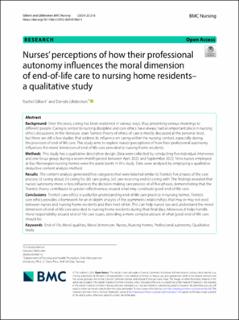| dc.contributor.author | Gilbert, Rachel | |
| dc.contributor.author | Lillekroken, Daniela | |
| dc.date.accessioned | 2024-04-02T08:04:52Z | |
| dc.date.available | 2024-04-02T08:04:52Z | |
| dc.date.created | 2024-03-28T12:56:59Z | |
| dc.date.issued | 2024 | |
| dc.identifier.citation | BMC Nursing. 2024, 23 (216), 1-14. | en_US |
| dc.identifier.issn | 1472-6955 | |
| dc.identifier.uri | https://hdl.handle.net/11250/3124392 | |
| dc.description.abstract | Background Over the years, caring has been explained in various ways, thus presenting various meanings to
different people. Caring is central to nursing discipline and care ethics have always had an important place in nursing
ethics discussions. In the literature, Joan Tronto’s theory of ethics of care is mostly discussed at the personal level,
but there are still a few studies that address its influence on caring within the nursing context, especially during
the provision of end-of-life care. This study aims to explore nurses’ perceptions of how their professional autonomy
influences the moral dimension of end-of-life care provided to nursing home residents.
Methods This study has a qualitative descriptive design. Data were collected by conducting five individual interviews
and one focus group during a seven-month period between April 2022 and September 2022. Nine nurses employed
at four Norwegian nursing homes were the participants in this study. Data were analysed by employing a qualitative
deductive content analysis method.
Results The content analysis generated five categories that were labelled similar to Tronto’s five phases of the care
process: (i) caring about, (ii) caring for, (iii) care giving, (iv) care receiving and (v) caring with. The findings revealed that
nurses’ autonomy more or less influences the decision-making care process at all five phases, demonstrating that the
Tronto’s theory contributes to greater reflectiveness around what may constitute ‘good’ end-of-life care.
Conclusions Tronto’s care ethics is useful for understanding end-of-life care practice in nursing homes. Tronto’s
care ethics provides a framework for an in-depth analysis of the asymmetric relationships that may or may not exist
between nurses and nursing home residents and their next-of-kin. This can help nurses see and understand the moral
dimension of end-of-life care provided to nursing home residents during their final days. Moreover, it helps handle
moral responsibility around end-of-life care issues, providing a more complex picture of what ‘good’ end-of-life care
should be. | en_US |
| dc.language.iso | eng | en_US |
| dc.rights | Navngivelse 4.0 Internasjonal | * |
| dc.rights.uri | http://creativecommons.org/licenses/by/4.0/deed.no | * |
| dc.title | Nurses’ perceptions of how their professional autonomy influences the moral dimension of end-of-life care to nursing home residents– a qualitative study | en_US |
| dc.type | Peer reviewed | en_US |
| dc.type | Journal article | en_US |
| dc.description.version | publishedVersion | en_US |
| cristin.ispublished | true | |
| cristin.fulltext | original | |
| cristin.qualitycode | 1 | |
| dc.identifier.doi | 10.1186/s12912-024-01865-5 | |
| dc.identifier.cristin | 2257574 | |
| dc.source.journal | BMC Nursing | en_US |
| dc.source.volume | 23 | en_US |
| dc.source.issue | 216 | en_US |
| dc.source.pagenumber | 1-14 | en_US |

